Author: Luo Xi
Translator: Ella N. Wu
ABSTRACT
Joe Shoong (1879-1961) was a Chinese-American entrepreneur and philanthropist who founded National Dollar Stores. He was one of the first Chinese-American millionaires and was once described by Time Magazine as the “richest, best-known Chinese business man in the U.S. ”. Though National Dollar Stores is now closed, it served the local communities for a long time in the 20th century. As a philanthropist, Shoong funded Chinese schools, universities, churches, hospitals and other organizations for educational or humanitarian purposes. After World War II, Shoong established the Joe Shoong Foundation, which continues to support local communities.
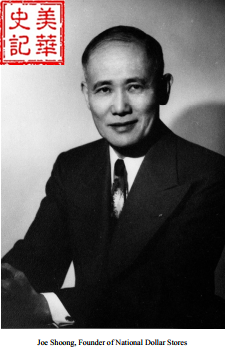
Zhou Song is the founder of The National Dollar Stores (Photo source Shoong Lee, Doris Oral History).
Zhou Song was born on August 30, 1879, in the village of Shaxi in the province of Guangdong. The village was built in the early Ming Dynasty. The emperor Qianlong described the village’s circular structure as “two dragons circling one another.” Zhou Song was one of the many in the village that migrated overseas, thus making the village the hometown of many Chinese immigrants. According to the village’s elders, Zhou Song’s father Zhou Lian set up a local school during the late Qing Dynasty. His father’s influence led Zhou Song to vow that “If I pass the qualification exams [to become a government official], then I will work to improve education for all.” However, as an adult, Zhou Song was only able to make a menial living by buying and selling eggs from village to village. Unsatisfied with this lifestyle, Zhou decided to immigrate to the United States when he was twenty. At the beginning of the twentieth century, the United States had enacted the Chinese-Exclusion Act. This act restricted Chinese people from immigrating to the United States and lasted 60 years before it was finally repealed in 1943. Zhou Song, however, completely unaware of this fact, was able to successfully immigrate to the US–a likely explanation being that some villagers from his hometown who already immigrated to the US helped him secure a job there. When he first arrived, he did not understand English, had no money, and had no relatives to depend on. Three of the village’s predecessors who had first migrated to the US opened a small shop in Vallejo in the San Francisco Bay Area of California, which became the site of Zhou’s temporary home in this new country. Though Zhou Song was the youngest of these Chinese immigrants, he was talented, hard-working, and soon rose above them all. Years later, Zhou Song could communicate in perfect English, which was a remarkable feat. In addition, Zhou’s mannerisms and speech often gave the impression that he had many years of formal education, when in reality he had no such experience. In 1903, Zhou bought his business partners’ stakes for their store in Vallejo, later named the China Toggery. Toggery is an 18th century word for clothes, but the store also sells a variety of dry groceries, household items, and kitchen supplies, in addition to men’s and women’s clothing.
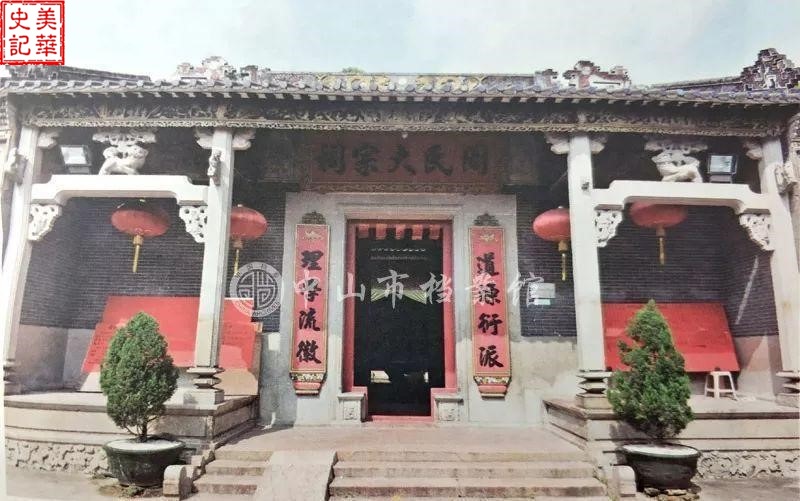
Zhou Wei The leading ring village of Shaxi Township, Guangdong Province (image from the network http://gdzs.wenming.cn/cjlswhmc/201509/t20150911_1977159.html).
In 1928, the China Toggery expanded to sixteen new locations, and Zhou changed the name of the store to National Dollar Stores and moved its headquarters to 929 Market Street, San Francisco. This was a large shopping mall, which included the main building and basement. Zhou Song intended to expand his business to reach a wider range of consumers. The National Dollar Stores was modeled after the China Toggery model, with about 40 stores in its prime, concentrated in the Southwest, including California, the cities of Seattle and Tacoma in Washington, Portland, Oregon, and the farthest one in Kansas, Missouri. Zhou had successfully executed his business philosophy: enabling poor people to spend the least amount of money to afford necessities and for people to recognize the full potential of a dollar store in the United States. Early on, he had already decided his future business path–making discount stores accessible to people in less affluent areas.
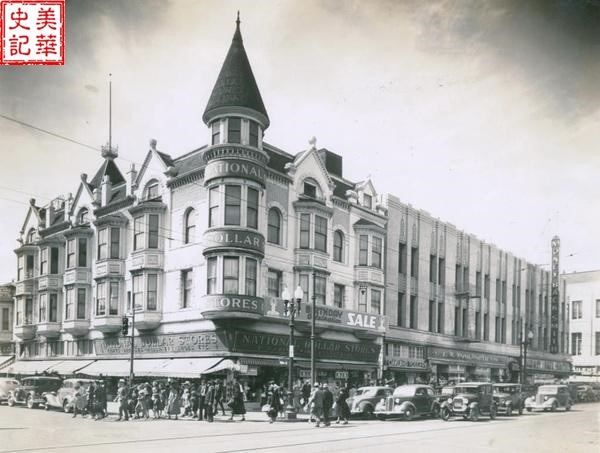
The U.S. dollar store San Francisco General Store (image source network) https://localwiki.org/oakland/National_Dollar_Stores
By 1916, at the age of 37, nearly 20 years after he came to the United States, his career had become successful enough to accumulate great wealth. Zhou married Rose Elizebeth Soo Hoo, a San Francisco-born Chinese woman. They had three children: daughters Bette Lorraine and Doris Jane and a son named Milton William Shoong. In order to provide a better living and learning environment for his children, Zhou moved out of Chinatown and bought a single-family villa in Oakland, California.Before this, Zhou had rarely voiced his thoughts on his Chinese identity and the discrimination he faced. It was only when he bought the house that, in order to avoid trouble, asked a white friend to buy the property and resell it to him. After moving to Oakland, everyday a chauffeur would pick up Zhou and his kids, first sending his children to school and then sending him to work at the store’s San Francisco headquarters. The family had a cook, a chauffeur, a housekeeper, a tutor, and five cars. At home, his children were asked to speak Cantonese, eat Chinese food, and play the piano. Even though he was married with kids, Zhou still worked six days a week, ate at home on the weekends, and made time to listen to the New York Philharmonic. In an interview, Zhou’s second daughter Doris recalled her family’s travels, saying, “Like typical businessmen, Zhou often traveled to buy property locally or open new stores. Family trips to Hawaii, for example, have opened two stores in Honolulu and Maui.”
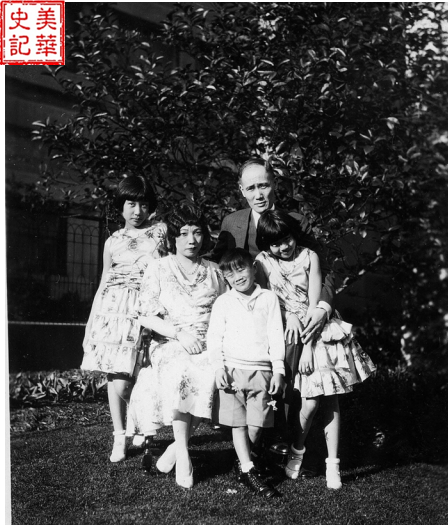
Zhou Song and his family in the garden of their Oakland home (photo source Shoong Lee, Doris Dictation History).
Zhou Song also treated his Chinese managers in the business as family, nurturing and enriching their skills while gaining their loyalty to the enterprise. Just as he did when he came to the United States, Zhou brought young people from rural China to provide them with guaranteed employment. Some of these Chinese employees live in shops, and some of the Chinese employees lived in managers’ homes without having to pay rent. In addition, Zhou also subsidized the children of his Chinese employees to attend school. Contrary to the business’s then-rival J.C. Penney, the National Dollar Stores was a chain business run by Chinese managers, and under these Chinese managers, the sales clerks were mostly white (there were about 400-1500 clerks depending on the sales season). This was the opposite of how many businesses operated at the time, the norm being that there were white managers and immigrant workers. It is important to note that in his administration, Zhou always treated everyone fairly regardless of race.
Of course, the National Dollar Stores was not entirely without disputes. The conflict with the workers’ unions was one of them. In the 1930s, the garment factories in San Francisco’s Chinatown had many workers. However, most of the factories were sweatshops with no trade unions, and of course, Chinese workers feared that if they demanded equal pay for equal work, they would be replaced by white workers. During this time, however, the National Dollar Stores paid their garment workers much fairer than most companies, averaging about fourteen dollars a week in comparison to ten dollars a week. Even though the National Dollar Stores paid their workers so generously, they were still able to make reasonably successful profits each year and own 51% of its stocks, with the other half belonging to Chinese elsewhere.
In 1938, Sue Ko Lee, a button worker at a National Dollar Stores in the United States, was inspired by the International Women’s Clothing Union (ILGWU) to create the Chinese Women’s Garment Workers’ Union. Under the leadership of the ILGWU, the Chinese Women’s Garment Workers’ Union fought and earned higher wages for Chinese garment workers. After a new contract was signed, Zhou soon sold his clothing factory to former employees of the National Dollar Stores, and the factory changed its name to the Golden Gate Bridge Garment Factory, causing the labor contract to be null and void. Disgruntled, unhappy workers gathered in front of three National Dollar Stores across San Francisco to protest, blocking construction and other daily operations. The strike continued for 15 weeks. In the end, Zhou was forced to resort to legal action, demanding $500,000 in damages from the female garment workers. Eventually he got the court’s support to stop the workers from preventing his business operations and to negotiate with them. The strike attracted widespread media attention because of the reputation of Zhou Song and the National Dollar Stores. The strike resulted in the female garment workers gaining some rights, however, the Golden Gate Bridge Garment Factory soon closed down, the workers were all unemployed, were unable to earn their wages. Fortunately, these unemployed female Chinese workers received help from trade unions to leave Chinatown and work in factories that had previously only employed white people. The women workers’ rights incident that broke out in 1938 around the National Dollar Stores has since become a highlight of Asian history from the perspective of the human rights movement. At the same time, this incident has also left us with a question: what kind of boss was Zhou Song? What were the working conditions of National Dollar Stores? Carol Fong, an elderly woman who now lives in Long Beach, California, told W.H.A. that she was a high school student that worked at the National Dollar Stores during the Christmas season of 1955, wrapping gifts and helping customers buy them. She said the working atmosphere was very warm, with many Chinese high school students working there. She recalls that on the weekends, they would all go to the Chinese church located in the 9th district of Los Angeles. It looks like only those in history can truly decide the answers to these questions!

Women garment workers went on strike in 1938 (photo https://ccsfexhibits.org/2010/03/24/sue-ko-lee-and-the-national-dollar-stores-strike-of-1938/).
In 1951, Zhou’s wife passed away. Between 1940 and the end of 1950, there was a shift in the way dollar stores were run, mainly in its management. When the size of the National Dollar Stores expanded to 35-40 stores, Zhou gradually withdrew from day-to-day business activities and left it to the managers, which allowed him to focus on stocks and real estate investments. Like many rich people, Zhou has a special shrewdness for investing. In 1929, after the Wall Street stock market disaster, he and his wife, a stockbroker, happened to be in New York at the time. On the train back to San Francisco from New York, every time the train stopped, Zhou asked his broker to sell his stocks. When the train arrived in San Francisco, the couple received a million-dollar check from Bank of America and were able to escape financial disaster before the stock market crashed. Before cashing in the check, Zhou made a copy of it and framed it with a photo frame.
With time, Zhou’s body began to worsen with age. He left the business primarily to Frank Lee and Wally Leong. In the end, he expected the National Dollar Stores to survive in the form of a trust fund, with Zhou and his two daughters accounting for three-fifths of the total. Zhou’s youngest son Milton owned his own shares of the Dollar Store stock while also inheriting shares from his mother, but he did not join the trust fund. Because Zhou and his daughter’s shares already accounted for 60% of the total shares, they had control over the company. In 1960, Zhou’s second daughter, Doris, joined the company’s board, while his youngest son, Milton, did not. The members of the Board of Directors were composed of four people, all appointed by Zhou. Zhou died three months after being hospitalized. Three weeks later, the board of directors began to operate. On the issue of the company’s assets, Zhou Song distributed the assets equally amongst his family. After his wife died, she gave her shares of the company stock to Milton, because in accordance with patriarchal tradition, property tended to be given to male heirs. After Zhou Song’s death, his assets were donated into the Zhou Song Foundation. Zhou’s charities were funded by this foundation, which was later handed over to his son, Milton.
Zhou Song exuded generosity, as he was charitable all throughout his life. In 1931, he financed the construction of the Chinese High School in San Francisco. In 1937, he donated $24,000 to the Chinese Hospital in San Francisco and $15,000 to China’s Anti-Japanese War Relief. In 1938, he donated $70,000 to the University of California, Berkeley, to establish scholarship opportunities for poor students. This was followed by the establishment of the $1 million Zhou Song Foundation which donated money for educational and other charitable purposes, such as for the Chinese Institute of Culture in Oakland. In 1928, Zhou Song also funded the construction of a Zhou Song school in his hometown in Guangdong, and in the following decades, $200,000 dollars worth of donation was contributed to the school. The Zhou Song school still exists today. Out of all of his endeavors and charities, education was still the utmost priority in Zhou’s eyes, because in his mind, education is the most valuable asset of life–despite hardships and losses, education is the one thing that no one can take away from an individual. Finally, In honor of Zhou’s contributions, the city of Las Vegas named a five-acre park after him.
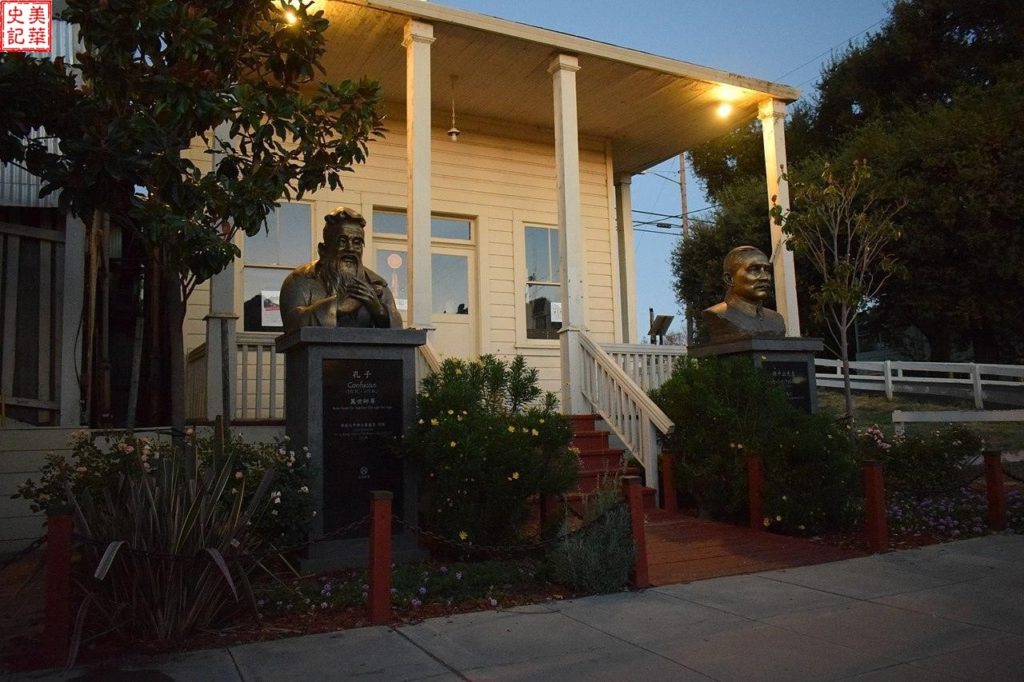
The school sponsored by Zhou Song (pictured https://en.wikipedia.org/wiki/Joe_Shoong).
Doris, Zhou’s second daughter, served on the National Dollar Stores board from 1960 to 1969. Zhou’s son had always wanted to be involved in the business, but he and his sister had difficulty agreeing on how to run it. Doris remarried in 1969 and moved her assets out of the company, which left Milton running the National Dollar Stores.
In 1965, race-related riots in the Watt area south of Los Angeles sparked a turning point in the rise and fall of Dollar Stores across the United States. Several of the Dollar Stores were vandalized by mobs, either ransacked or set on fire. Fortunately, after the incident, the insurance company paid $8 to $9 million in damages. But Mr. Zhou’s son, Milton, insisted on rebuilding these stores, but because the area’s population had moved out, even after rebuilding the stores, business was failing. In addition, many other problems arose in the running of the National Dollar Stores. After Milton suffered two strokes, he gave the business to his two daughters, who had no business experience at all. His eldest daughter, Rosemary, who had graduated from college, devoted her life to spiritual and religious hermitage and traveled the United States with her guru. Milton’s younger daughter married a young man early and settled in Lake Tahoe, on the California-Nevada border. The couple, who ran a construction company, usually attended to the operation of the Dollar Stores by phone. This sort of management would eventually lead to failure.
By the 1990s, dollar stores across the United States were hit by the recession and competition from other discount chains across the country. In 1992, 11 Dollar Stores were damaged in the Los Angeles riots. In February 1996, Milton instructed his daughters, after speaking with lawyers, to shut down all the National Dollar Stores. It was then that Zhou Song’s National Dollar Stores came to end.
Though the National Dollar Stores ended by tragedy, Zhou Song’s legacy lives on prosperously. He was a young immigrant man who built an empire with his own two hands, which sparked the rise of dollar stores throughout the United States. He also supported a family and a community which he so generously cared for. Despite racial, social, and economic hardship, Zhou Song lived the American Dream. His own dream lives on, too. He was able to make education accessible to the students in his small hometown in Guangdong to the bustling city of his American home in San Francisco.
Resources:
1. Shoong Lee,Doris(2006) Carrying on the Family Legacy of Chinese American Entrepreneurship and Philanthropy.
2. Time magazine http://content.time.com/time/subscriber/article/0,33009,759404-1,00.html March 28, 1938
3. Joe shoong, Wikihttps://en.wikipedia.org/wiki/Joe_Shoong
4. “Zhongshan: Shaxi tap ring Zhou clan heritage Zhou Dunyi Elaine spirit”http://gdzs.wenming.cn/cjlswhmc/201509/t20150911_1977159.html
5. Sue Ko Lee and the National Dollar Stores Strike of 1938https://ccsfexhibits.org/2010/03/24/sue-ko-lee-and-the-national-dollar-stores-strike-of-1938/
美华史记|周崧 :20世纪初第一位美华百万富翁和全美一元店
作者:西洛 (Luo Xi)
编辑:黄倩 (Qian Huang), 远方 (Fang Yuan), 婕妮 (Jenny Zheng)
摘要
周崧(1879-1961),著名美国华人企业家和慈善家,被《时代杂志》称为“美国最富有、最知名的华商。”其创办的40家全美一元店(National Dollar Stores)曾在二十世纪相当长的时间里为当地社区提供产品和服务。作为慈善家,他资助的项目包括中华文化中心、中美两地的学校、大学、医院等诸多机构和组织。二战后,他建立了周崧基金会,在他去世后,基金会依然不断回馈社区,成为周崧留给社会的遗产。
Wish the author would stick to historical names, not pinyin. Shaxi is the township or district to which Joe Shoong’s home village is one of many. The village name is 龍頭環 or Lung Tau Wan in transliteration. It has three main family clans apart from Joe/ Chow/ Chau or in pinyin Zhou. Joe is the most prominent.